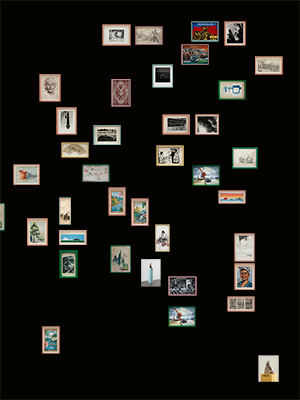Since 2009, Liu Ding has collected “everyday” artworks from online auctions, flea markets, and friends. These include paper-cuts, embroidery, sketches, watercolor paintings, oil paintings, woodcuts, and sculptures, most of whose motifs, styles, and genre are familiar and common. Yet these artworks hold no “special” status, significance, or value. Typically they are gifts or souvenirs, they decorate homes or hotel lobbies, or they are made as part of an artist’s training or by an amateur. They are part of history and our experience of art and aesthetics, but without having a distinct place in art history. And yet they express and reflect the sensibilities, desires, and states of consciousness of their makers just as much as the social context in which they exist.
Liu Ding says that he wishes to act like as “agent” for those works, as he seeks to make them visible and bring them to consciousness, choreographing or “staging” their appearance and interrogating how they shape the perception of art. Each work he acquires for his collection is mounted in a new frame, usually in bright colors. Liu Ding places his artistic signature on those frames.
On the opening day of the Taipei Biennial, Liu Ding will mount a selection of his collection in an installation consisting of a booth and a stage where these works will be displayed. Together with the Beijing-based artist Li Ran, each work, while being installed, will be the subject of a conversation and a detailed interrogation. The installation process will be simultaneously filmed with a video camera set outside the booth and directly facing the artists. On the second day, in the very same booth where the collection is on view, Liu Ding, Li Ran, and the Taiwanese scholar and art historian Meiling Cheng will discuss the collection in an attempt to bring it into a direct relationship with us today. This discussion will also be recorded on video. At the end of the performances, the two videos will remain unedited and on view on two TV screens installed outside the booth, with the collection remaining on display throughout the exhibition.
Liu Ding, born 1976 in China, lives and works in Beijing

